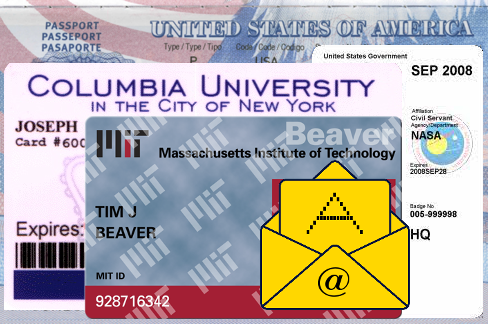
Secure Contact
Whether it's for IT consulting or services like Apscitu Mail, you are about to contact me — Duane Thresher, B.S., M.S., Ph.D., CEO of Apscitu Inc. — about entrusting some of your most important and private information to me. You should have some proof of who I am — authentication — before doing so.
I also require some authentication of you; see the "Select clients" note in the Legal Notes section of the About Apscitu Law page on the Apscitu Law website.
Phone numbers provide no easy means of authentication (and even for businesses should not be put on webpages, so I don't include one here).
There are authentication methods you can use in email, but you are contacting me because you don't know how to securely use these and in general these methods are not very good. (Authentication is the lesser-known half of email security, the other well-known half being encryption, for which there are very good methods; Apscitu Mail uses these.)
So how do we do this first contact?
There are email address domains that are restricted in who can get them — to get one you have to be authenticated. Two of the most common are .edu and .gov. For example, to get a .edu email address you would have to have attended a university and to get a .gov email address you would have to work in government.
I have a B.S. in Electrical Engineering and Computer Science from MIT so have the email address dr.duane.thresher@alum.mit.edu. I also have a Ph.D. in supercomputing from Columbia University so have the email address dr.duane.thresher@caa.columbia.edu. So to authenticate me first email me at one of these university email addresses.
To authenticate you, email me, at least the first time, from your .edu or .gov account. If you have neither, you can email me from your business (.com) or organization (.org) account, preferably with a username that is your name, and I will do some authenticating using that email address. Please, no emails from yahoo.com, gmail.com, etc. Anyone can get one or more of those email addresses without authentication and they are immediately suspect.
Don't send any sensitive information yet, just whether you are generally interested in consulting or Apscitu Mail (extended consulting includes Apscitu Mail) and your phone number.
I will email you back from dr.duane.thresher@apscitu.com, which is an account on one of my ultra-secure Apscitu Mail email servers, or call you, and provide my phone number and proof of receiving your email, thus authenticating me. (Like for emails from anyone, you should check your spam folder at least once a day. Apscitu Mail doesn't need a spam folder.)
Actually, I've set it up at the universities so that dr.duane.thresher@alum.mit.edu and dr.duane.thresher@caa.columbia.edu simply forward to one of my ultra-secure Apscitu Mail email servers, which are far more secure than the university email servers (e.g. see The Doomsday Microsoft Government Email Data Breach). In fact, not only don't send any sensitive information via these university email servers, but if you are uncomfortable even having your name go through them, and are comfortable I've authenticated myself, email me directly at dr.duane.thresher@apscitu.com.
With this first contact made, we can decide how to proceed from there, but to include phone calls and face-to-face meetings, which is the foundation of both authentication and custom service. Would you interact with your doctor or lawyer — to whom you also entrust some of your most important and private information — as just an online entity?
As indicated in the introduction above, all information you provide, including email address, phone number, and that you contacted me at all, is strictly confidential. That is the whole point of Apscitu, ultra-security, and privacy is a part of security.
